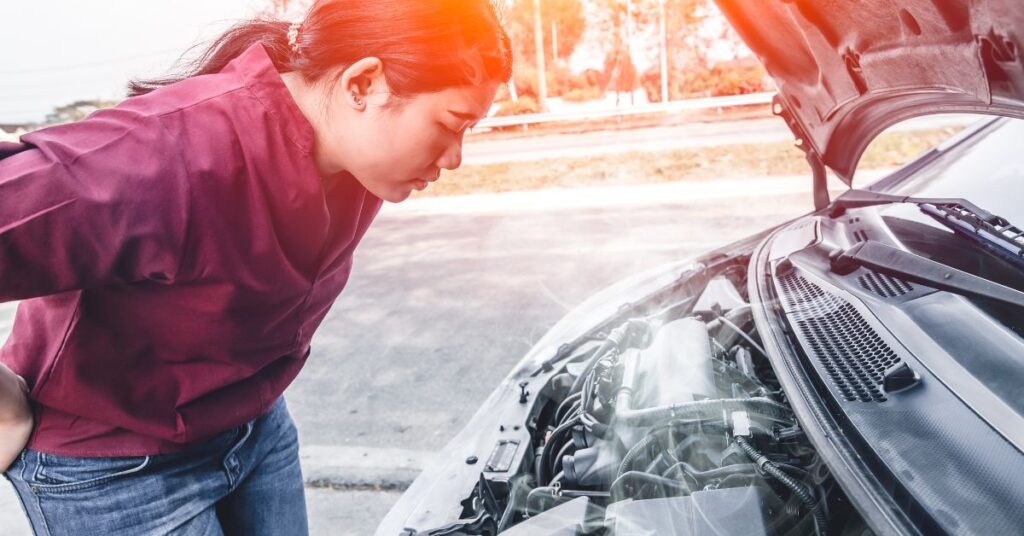
Table of Contents
Summers in Atlanta, Georgia, can be sweltering, and that heat can take a toll on your vehicle. Protecting your car from the harsh summer conditions isn’t just about comfort but helping avoid heat-related vehicle breakdowns. This article will walk you through various preventative maintenance steps to help mitigate the impact heat has on your vehicle.
Check the Battery Twice a Year
The battery in your car is more vulnerable to extreme temperatures than you might think. High heat can accelerate the degradation of a battery by speeding up the chemical reactions inside and causing fluids to evaporate. This can lead to reduced battery life and unexpected failures.
By having your battery checked before the peak of summer and again before winter, our technicians can assess its health, clean connections, check for necessary fluid levels, and ensure that it can hold a charge. Regular battery checks help you avoid the inconvenience of a car that won’t start due to battery issues, especially on hot days when the demands on your vehicle are higher.
Check Tire Pressure and Condition Regularly
Temperature swings can significantly affect tire pressure. For every 10-degree change in temperature, your tire’s air pressure might shift about 1-2 PSI. Overinflated tires, a common issue in hot weather, are less effective at maintaining proper road contact, which can increase wear and lead to blowouts. Regular checks ensure that tires are inflated to the manufacturer’s recommended levels, optimizing safety and performance.
Furthermore, inspecting your tires for signs of wear, such as cracks, bulges, or uneven tread wear, is an essential maintenance practice. Such checks not only contribute to safer driving but also improve fuel efficiency and prolong the lifespan of your tires.
Maintaining Engine Cooling Systems
Your car’s engine cooling system is fundamental in managing engine heat, especially during high temperatures. A well-maintained radiator and proper levels of coolant ensure that heat is efficiently transferred away from the engine. Having your cooling system inspected regularly for leaks will help ensure the coolant is filled to the correct level. Additionally, having the system flushed periodically removes old coolant and contaminants that could impair cooling efficiency.
Getting Regular Oil Changes
Oil is essential for lubricating the engine’s moving parts, reducing friction, and helping to dissipate heat. As oil ages, it loses its effectiveness at cooling and lubrication, which can increase the engine temperature. Regular oil changes replace old, degraded oil with fresh oil with better protective and cooling properties. Furthermore, during your oil change, we will check for any signs of excessive oil consumption or leaks, as these can also lead to engine overheating. This maintenance prolongs your engine’s life and ensures it runs efficiently, particularly in challenging conditions like a hot summer day.
Topping Off Fluids
Keeping all vehicle fluids at their recommended levels is more important than it might seem. This includes transmission fluid, brake fluid, and power steering fluid, all of which play a critical role in your vehicle’s safe and efficient operation. Low fluid levels can lead to increased friction and heat generation in the respective systems, which can cause mechanical failures under stress from high temperatures.
Pay Attention to the Air Conditioner
A functioning air conditioner reduces the strain on your vehicle during hot weather. If the air conditioning system malfunctions, it can put an additional load on the engine. Regular maintenance of your air conditioning system helps ensure the compressor is functioning correctly and that the refrigerant levels are where they need to be. Additionally, a well-functioning AC system helps maintain the vehicle’s electrical system and to avoid overheating.
Multi-Point Inspections with McCullough NAPA Auto Care
Taking preventative steps to maintain your vehicle extends its life and ensures it performs optimally in the heat of Atlanta’s summers. If you’re unsure where to start or what your vehicle might need, contact McCullough NAPA Auto Care.
We offer a complimentary multi-point inspection with qualifying services, which provides a thorough diagnostic overview of the health of your car. Schedule your service today to take proactive steps toward avoiding heat-related breakdowns and keep your summer driving smooth and safe.
FAQ About How Heat Affects Your Car
Yes, extreme heat can cause significant damage to your car. It can affect the battery, cooling system, tires, and various fluids, leading to increased wear and potential breakdowns.
Cars can indeed run differently in hot weather. High temperatures can affect engine performance, fluid levels, tire pressure, and air conditioning efficiency, which may alter how your car operates.
Hot weather can stress your car’s mechanical systems. Issues like overheating, faster battery degradation, and increased tire pressure can arise, causing your car to act up or perform poorly.
Yes, excessive heat can cause your car to turn off as a protective measure to prevent engine damage. Overheating can trigger safety mechanisms that shut down the engine to avoid further damage.
Temperature has a significant effect on car batteries. High temperatures can accelerate chemical reactions inside the battery, leading to faster degradation and reduced lifespan.
Heat increases the air pressure in your tires, which can lead to overinflation. This might reduce traction, increase tire wear, and heighten the risk of blowouts.
Extreme heat can overwork your car’s AC system, leading to reduced efficiency. It can strain the compressor, use up refrigerant faster, and cause other components to work harder than usual, potentially leading to failures.

